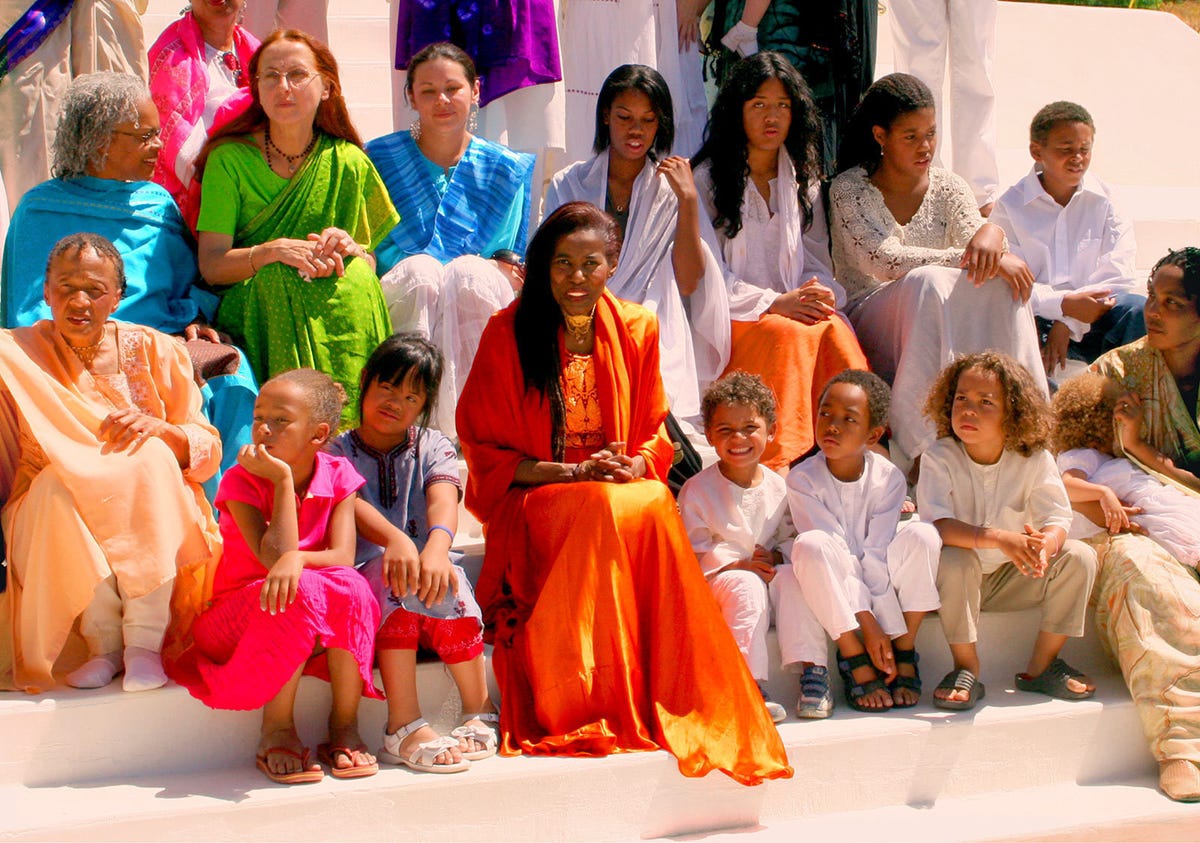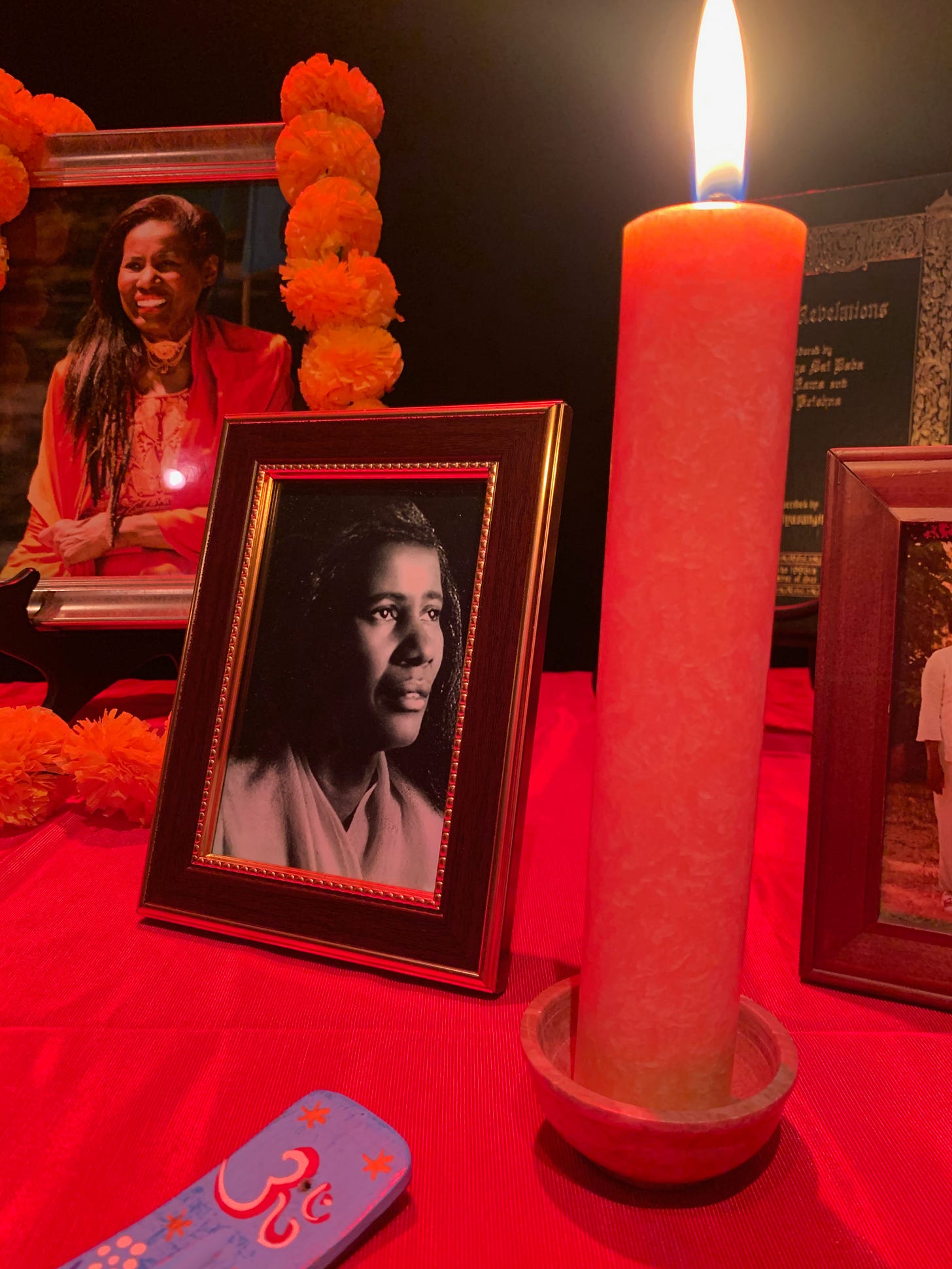Alice Coltrane's Divine Interventions
On her 1978 recording "Prema" and our recent event in Los Angeles celebrating her ecstatic music.
Rather than selfish love, karma, prema refers to a divine higher love.
Divinity is the highest form of art. — Alice Coltrane
Prema, echoes of primordial and primal and ma or the mother, and ra, or the universal sun who becomes the worshiped calf with the simple addition of an m , the ram, the ramp the sun travels to carry us to other lights, merging there like a wish to be doubled, like the ram’s two horns, like the devil’s sun hallowed with rays which are the sharp transparent orders of a new way of misbehaving— where the angelic forces and the dark forces meet in words and diverge in sounds choosing their own paths regardless of the entities riding them as voices and tools that we call instruments. Prema. Higher love, higher ground, karma dissolved by an awe that overrides attachments but demands devotion. To love so unconditionally when you are not the sun, you would have to unravel seasons and generations and lifetimes of conditioning and shadow-making to access the internal flame, and for that you would need a sound. The sound is prema, ma, prima, primordial unwinding, prism, primal muttering, mothering.
John Coltrane died in July of 1967 and a few weeks later a harp, a gift from him purchased before his passing, was delivered to his wife Alice Coltrane at their residence in Long Island. Her continued devotion to him would manifest in part as devotion to this instrument. Prema. Prayers for strings. She taught herself to play it, just as she had taught herself piano by ear as a child in Detroit playing on church organs. The Coltrane household became a heavens when she played, her fingers starry-eyed with blisters, the 4 Coltrane children sleeping through renditions of ascension. The highest degree of mourning is praise. Sorrow loosens its grip and makes way for some version of the ecstatic, and what at first felt like loss and abandonment can in time feel like guidance and accompaniment, the generous move of a loved being into another dimension where he helps guide you through this one and back to him or back to yourself. Or at least that’s what I imagine when I hear Alice Coltrane’s playing as she advanced on this gifted instrument, relentlessly returning the gift not just to John but to all of us who listen.
Prema. Her song by this title, recorded live in 1978 for her album Transfiguration, is the sonic equivalent of weeping. Alice is on piano for this track and keys fall like tears in the low tones for 7 of the ten minutes of her playing, and then they reach bliss and begin blushing, which in this context is expressed as higher more coiled notes, accelerated spirals instead of dirges, a flood of strings like lovers embracing at the end of a film, knowing they will look up and realize it’s a dream, then beyond that realizing that the separation was illusory too. The strings: cello, violin, and viola, were there the entire time but as atmospheric accents. During Alice’s crescendos they are silent for a while and then re-emerge sweeter, less acidic, and stirred into reverb. The clapping and shouting at the end of the recording is part of the music here, part of the call-and-response between prema and karma. This is the self teaching the self that life is but a dream, a long act of self-mothering that makes us all into divine mother archetypes for its duration or sends us back to try again. Prema, a regenerative sound so ancient that it is the only modern thing, a mothering so ever-present it feels gone. Prema, our resentment for the invisible and the rogue turned to reconciliation and glorying.
I listen to Alice Coltrane’s Prema and think about traction in music, about the constant play between holding onto or gripping a note and letting it go on to become a chord, chorus, Horus, its own god and entity. This composition allows the psyche to grow from one attached to its desires, to an active and satisfied observer of them, grateful for the fact that enough enthusiasm for life exists to still want, but not turning each stage of that wanting into suffering and longing just to distract oneself or pass the time, as is a common tendency. Prema, the removal of suffering, the decision to not pursue pain and karma for entertainment, the traction of the grip of notes as they carry it into a rhythm and slip out of their own hands, abandoning their own biases about the best direction. What does it feel like to slip while listening or creating music and drift into a portal you opened but do not control? Opportunity and dread of the responsibility that comes with it, resolution and dissolution. Prema
This past weekend at the venue and archive space that I co-curate with a group of friends in Los Angeles, we invited the Coltrane family for a two-day celebration of her ecstatic music and her Ashram community. She maintained her Sai-Anantam Ashram in Agoura Hills, California for decades, beginning in 1983. It’s fitting that 1983 is the title of her grandnephew Flying Lotus’s debut album. It’s the year he was born, and he grew up spending time in that intentional community that was born the same year as him. And despite the fact that the physical space of the Ashram was destroyed in seasonal fires in 2017, there is an other-worldly attraction that I would even go so far as to label divine, that the music and community built in and around that space maintains. Also in 2017 the label Luaka Bop released an album of ecstatic music recorded at the Ashram that had only been available on cassette tapes previously.
Having spent some time around the community myself, albeit an extremely brief amount within the context of its long legacy, I can observe that eternal and divine traction, that prema, that collective mothering without the nagging, is born of sounds, syllabics, whistles, brushes, drums, repeating, chanted, etched into the subconscious minds of those who encounter them, a reprogramming that does not become indoctrination or subliminal mind games, nothing vicious or insidious or coercive in it. The ecstatic practice and music of the ashram community suggests a divine potential without demanding that you follow the tenets of any organized religion or occult tradition to understand and receive that potential energy. Alice and John Coltrane’s daughter Sita Michelle Coltrane and their nephew Surya Botofasina help direct the music and energy during live performances, which are not performances in the traditional sense where audiences are expected to watch in silence and applaud on cue, but participatory events, gatherings, where the audience is meant to join in chanting and processing the ancient sounds used in each song. John Coltrane once said when I know a man’s sound I know that man. When you know the sound or tonal force or idea, you also comprehend its beingness, and therefore have a better chance of reaching out to it or uniting with it at will, as your own will joins with a so-called divine will to remember that these intonations were never truly separate or at odds. Prema.
Our celebration of this tradition called in powers larger than ourselves— it called in beauty, it called in calm, it called in existential absurdity, it called in energy of the deity Ganesha, it even called in Ye, the artist formerly known as Kanye West, who joined our Sunday service right after hosting his own in Downtown, Los Angeles. As we were closing the event one of the singers noted, Alice, whose Sanskrit name is Turiyasangitananda, called him in, as she had each soul there, her and Prema, the divine mothering aspect whose patient and deliberate way had turned a whimsical notion into collective catharsis after an era of unknotting of gnarled forces, this coming together to initiate reprieve and a letting go of any shame we project onto divine faith or belief in the miraculous, so that we may remain unabashedly in love with music and understand why that is a destiny worth praising. Prema.









I could practically hear the harp playing as I was taking in your words & images. Congrats on the event, looks like it was an ethereal convening.
Bless you, Alice, for your vibration & light. love